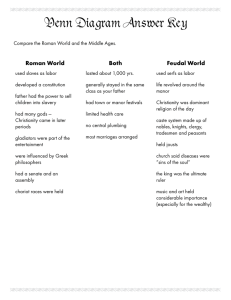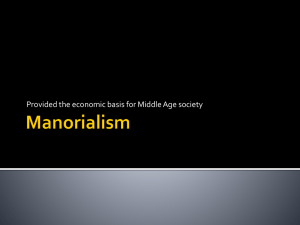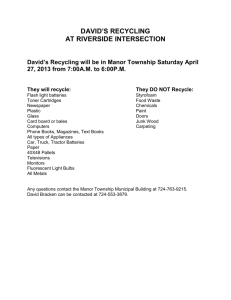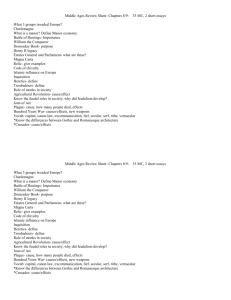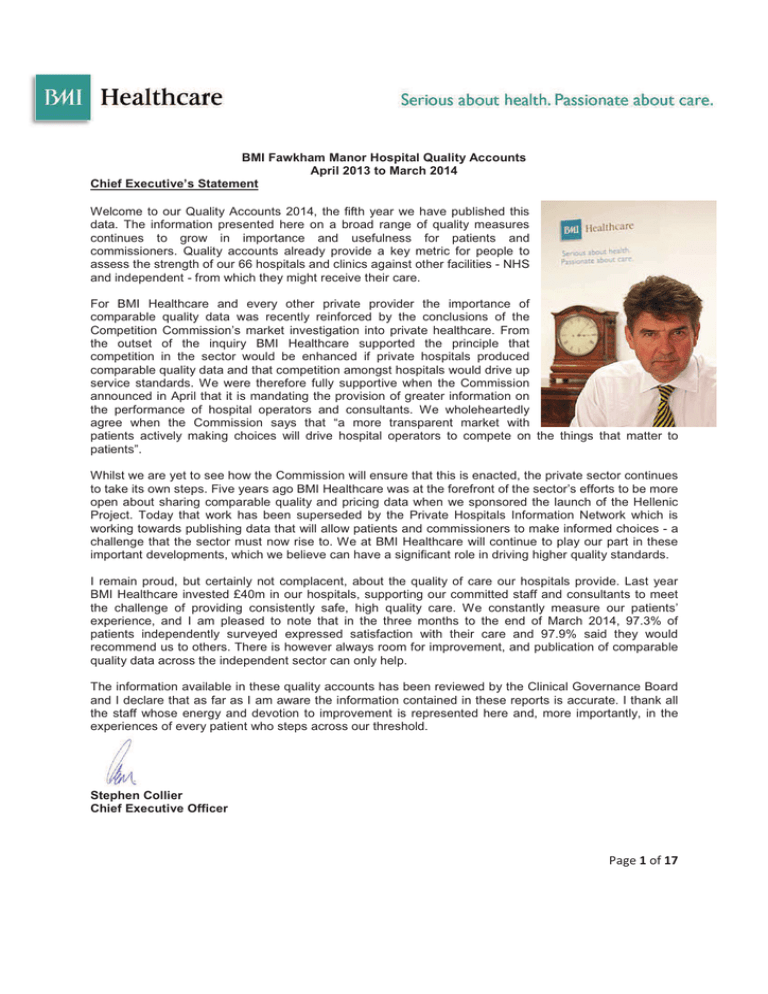
BMI Fawkham Manor Hospital Quality Accounts
April 2013 to March 2014
Chief Executive’s Statement
Welcome to our Quality Accounts 2014, the fifth year we have published this
data. The information presented here on a broad range of quality measures
continues to grow in importance and usefulness for patients and
commissioners. Quality accounts already provide a key metric for people to
assess the strength of our 66 hospitals and clinics against other facilities - NHS
and independent - from which they might receive their care.
For BMI Healthcare and every other private provider the importance of
comparable quality data was recently reinforced by the conclusions of the
Competition Commission’s market investigation into private healthcare. From
the outset of the inquiry BMI Healthcare supported the principle that
competition in the sector would be enhanced if private hospitals produced
comparable quality data and that competition amongst hospitals would drive up
service standards. We were therefore fully supportive when the Commission
announced in April that it is mandating the provision of greater information on
the performance of hospital operators and consultants. We wholeheartedly
agree when the Commission says that “a more transparent market with
patients actively making choices will drive hospital operators to compete on the things that matter to
patients”.
Whilst we are yet to see how the Commission will ensure that this is enacted, the private sector continues
to take its own steps. Five years ago BMI Healthcare was at the forefront of the sector’s efforts to be more
open about sharing comparable quality and pricing data when we sponsored the launch of the Hellenic
Project. Today that work has been superseded by the Private Hospitals Information Network which is
working towards publishing data that will allow patients and commissioners to make informed choices - a
challenge that the sector must now rise to. We at BMI Healthcare will continue to play our part in these
important developments, which we believe can have a significant role in driving higher quality standards.
I remain proud, but certainly not complacent, about the quality of care our hospitals provide. Last year
BMI Healthcare invested £40m in our hospitals, supporting our committed staff and consultants to meet
the challenge of providing consistently safe, high quality care. We constantly measure our patients’
experience, and I am pleased to note that in the three months to the end of March 2014, 97.3% of
patients independently surveyed expressed satisfaction with their care and 97.9% said they would
recommend us to others. There is however always room for improvement, and publication of comparable
quality data across the independent sector can only help.
The information available in these quality accounts has been reviewed by the Clinical Governance Board
and I declare that as far as I am aware the information contained in these reports is accurate. I thank all
the staff whose energy and devotion to improvement is represented here and, more importantly, in the
experiences of every patient who steps across our threshold.
Stephen Collier
Chief Executive Officer
WĂŐĞϭŽĨϭϳ
Hospital Information
BMI Fawkham Manor Hospital is a 35 bedded hospital situated in the very picturesque village of
Fawkham. It is accessible by road with the local railway station within 4 miles having excellent links to
London and the international station of Ebbsfleet within 6 miles. It has two wards, Mulberry and
Hawthorne including one High Dependency bed. This also incorporates an oncology room in our recently
refurbished upstairs ward. Each room offers the privacy and comfort of en-suite facilities, satellite TV and
telephone. Our convalescent rooms oversee the beautiful grounds of the Manor. We have seven
spacious Consulting Rooms, Physiotherapy and Pharmacy departments on site, two operating theatres
and 1 minor procedures Theatre. The hospital has an Imaging Suite with a mobile MRI Scanner for 3
days per week and a mobile CT Scanner 1 day each week.
In this financial year, we have refurbished the 2 operating Theatres whilst installing a new air handling
th
system and Laminar flow. The opening ceremony of this department took place on the 9 January 2014
where we were joined by the Mayor of Dartford and consultants to honour the occasion. This has been a
great improvement to our facilities.
The percentage of NHS patients for this financial year under Choose and Book was 30%.
BMI Healthcare are registered as a provider with the Care Quality Commission (CQC) under the Health &
Social Care Act 2008. The focus is on healthcare outcomes rather than process and the key requirement
is to provide evidence of these and not just to produce the policy. The Group Quality and Risk Team
continue to provide guidance and support to ensure compliance with all regulatory standards. Yearly
unannounced provider visits to all BMI sites helps us to monitor performance and address any issues.
BMI Fawkham Manor Hospital is registered with the CQC as a location for the following regulated
services:•
•
•
Treatment of disease, disorder and injury
Surgical procedures
Diagnostic and screening
WĂŐĞϮŽĨϭϳ
•
Family Planning.
th
The CQC carried out an unannounced inspection on 16 December 2014 and found us to be compliant in
the following areas. These results are published on the CQC website.
Care and Welfare of people who use the service
Cleanliness and Infection Control
Assessing and Monitoring the quality of service provision
Governance
Fawkham Manor Hospital has a local framework through which clinical effectiveness, clinical incidents
and clinical quality is monitored and analysed. Where appropriate, action is taken to continuously improve
the quality of care. This is through the work of a multidisciplinary group and the Medical Advisory
Committee.
Regional Clinical Quality Assurance Groups monitor and analyse trends and ensure that the quality
improvements are operationalised. There has been a continued development of the Enhanced Recovery
Programme to improve quality standards.
At corporate level the Clinical Governance Board has an overview and provides the strategic leadership
for corporate learning and quality improvement.
There has been ongoing focus on robust reporting of all incidents, near misses and outcomes. Data
quality has been improved by ongoing training and database improvements. New reporting modules have
increased the speed at which reports are available and the range of fields for analysis. This ensures the
availability of information for effective clinical governance with implementation of appropriate actions to
prevent recurrences in order to improve quality and safety for patients, visitors and staff.
At present we provide full, standardised information to the NHS, including coding of procedures,
diagnoses and co-morbidities and PROMs for NHS patients.There are additional external reporting
requirements for CQC, Public Health England (Previously HPA) CCGs and Insurers
BMI is a founding member of the Private Healthcare Information Network (PHIN) UK – where we produce
a data set of all patient episodes approaching HES-equivalency and submit this to PHIN for publication.
The data is made available to common standards for inclusion in comparative metrics, and is published
on the PHIN website http://www.phin.org.uk. This website gives patients information to help them choose
or find out more about an independent hospital including the ability to search by location and procedure.
1.
Safety
1.1
Infection prevention and control
The focus on infection prevention and control continues under the
leadership of the Group Head of Infection Prevention and Control, in
liaison with the link nurse in Fawkham Manor Hospital.
WĂŐĞϯŽĨϭϳ
The focus on infection prevention and control continues under the
leadership of the Group Director of Infection Prevention and Control
and Group Head of Infection Prevention and Control, in liaison with
the Infection Prevention and Control Lead Fawkham Manor Hospital.
We have had: • Zero cases of MRSA bacteremia in the last year (NHS
1.17cases/100,000 bed days).
•
Zero MSSA bacteremia cases /100,000 bed days
•
Zero E.coli bacteremia cases/ 100,000 bed days
•
Zero cases of hospital apportioned Clostridium difficile in the last 12 months.
•
SSI data is also collected and submitted to Public Health England for orthopaedic surgical
procedures. Our rates of infection are:
o Hips - Zero
o Knees - Zero
IP&C is continually monitored and audited throughout the year using various audit tools.
The following audits were completed and additional information is supplied where applicable.
Ͳ
Mattress audit – checking of all mattresses within the wards and Pre-admission clinic. There has
been a programme of mattress replacement and the 2014 audit reported all mattresses in use as
acceptable.
Ͳ
Sharps audit – Completed December 2013. Annual check by Daniels Representative for all
clinical areas to assess compliance in the use of sharps containers. Areas for improvement
included temporary closure mechanism not in use, inappropriate items in the sharps container,
and incorrect assembly. Action plans received from relevant departments.
Ͳ
All clinical departments are involved in IPS audits on an annual basis. The audits cover general
IP&C management as well as cleanliness, hand hygiene, PPE, waste, sharps, and linen
management, standard precautions etc. Each section is given a percentage score and then an
overall score is calculated. Action plans are requested for areas where improvement is required.
Improvements of note include the positive effects of a major theatre refurbishment and review.
This included improvements to the air handling unit and ventilation, replacement operating lights,
general décor, and provision of additional waste receptacles.
Ͳ
On the main ward, patient rooms have had carpets removed and replacement vinyl laid down.
There is an ongoing programme of painting works to improve general décor. The staff
noticeboard is regularly up-dated to communicate new information and audit results. Cleaning
schedules include guidance on product use and PDI wipe holders have been supplied to promote
decontamination of patient equipment at point of use.
Ͳ
High Impact Care Bundles are completed quarterly in appropriate clinical areas for urinary
catheter/peripheral cannula insertion and ongoing management and for prevention of surgical site
WĂŐĞϰŽĨϭϳ
infection. Central lines are not regularly used but the Care Bundle information is promoted. The
Care Bundle audit for taking of blood cultures is to be commenced but this procedure is also not
regularly completed at FMH. Results are fed back to the departments and action plans requested.
Ͳ
For all staff with direct patient contact, hand hygiene workshops are held at regular intervals with
a hand hygiene competency document included. This is ongoing and compliance audits have
been completed in clinical areas by department IP&C Links. The compliance audit includes
checks on the “bare below the elbows” (BBE) policy. This highlighted the need to discuss and
confirm correct practice in one of the departments. This will be monitored in future compliance
audits. At the workshops, staff are asked to consider their own areas of practice and to report
any concerns re accessing hand decontamination products at the point of care. Compliance audit
results suggest that hand gel is readily available.
Ͳ
ANTT is moving to a standardised practice as directed by Stephen Rowley and his organisation’s
assessment tools and method of training will be implemented. In the meanwhile, posters outlining
the concept of “key parts” and “key sites” for aseptic procedures have been circulated to the
ward, theatre, and OP departments. These posters provide a visual reminder of the essential
steps in a procedure and best practice for avoiding cross-infection.
Ͳ
The hospital has moved to cleaning processes utilizing microfiber cloths which have been shown
to remove dirt etc. more effectively than regular cleaning cloths without the use of cleaning
products and hence the build-up of residues.
Environmental cleanliness is also an important factor in infection prevention and our patients rate the
cleanliness of our facilities highly.
Results from in patient survey data
1.2
Patient Led Assessment of the Care Environment (PLACE)
We believe a patient should be cared for with compassion and dignity in a clean, safe environment.
Where standards fall short, they should be able to draw it to the attention of managers and hold the
service to account. PLACE assessments will provide motivation for improvement by providing a clear
message, directly from patients, about how the environment or services might be enhanced.
WĂŐĞϱŽĨϭϳ
In 2013 we introduced PLACE, which is the new system for assessing the quality of the patient
environment, replacing the old Patient Environment Action Team (PEAT) inspections.
The assessments involve patients and staff who assess the hospital and how the environment supports
patient’s privacy and dignity, food, cleanliness and general building maintenance. It focuses entirely on
the care environment and does not cover clinical care provision or how well staff are doing their job.
The results will show how hospitals are performing nationally and locally.
Summary of PLACE Audit 2013 for Fawkham Manor Hospital showed that overall the audit results were
good with a few areas for improvement.
The toilet facilities appeared to be the main areas for amendment. A minor works project up dated the
disabled toilet on the ground floor and minor changes were made to one of the toilet facilities in the Out
Patient department. The male toilet facilities at main reception have also required some remedial work.
Privacy and dignity scoring was affected by some concern regarding the potential for conversation
between receptionist and patient to be overheard in the main reception area. There has not been any
direct patient complaints regarding this issue, but staff are mindful of the situation.
Our housekeeping department are an effective team as regards general cleanliness and our in house
catering facilities can provide varied quality meals to suit most appetites.
PLACE Results for Fawkham Manor Hospital are shown below:
WĂŐĞϲŽĨϭϳ
1.3
Venous Thrombo-embolism (VTE)
BMI Healthcare, holds VTE Exemplar Centre status by the Department of Health across its whole network
of hospitals including, Fawkham Manor Hospital. BMI Healthcare was awarded the Best VTE Education
Initiative Award category by Lifeblood in February 2013 and were the runners up in the Best VTE Patient
Information category.
We see this as an important initiative to further assure patient safety and care. We audit our compliance
with our requirement to VTE risk assessment every patient who is admitted to our facility and the results
of our audit on this has shown 100%. This result will be maintained at 100% as all staff are vigilant to the
pre-operative VTE assessment.
Fawkham Manor Hospital reports the incidence of Venous Thromboembolism (VTE) through the
corporate clinical incident system. It is acknowledged that the challenge is receiving information for
patients who may return to their GPs or other hospitals for diagnosis and/or treatment of VTE post
discharge from the Hospital. As such we may not be made aware of them. We continue to work with our
Consultants and referrers in order to ensure that we have as much data as possible. .
No incidents of VTE have been reported from the quality data spreadsheet for Fawkham Manor Hospital.
2.
Effectiveness
2.1
Patient reported Outcomes (PROMS)
Patient Reported Outcome Measures (PROMs) are a means of collecting information on the effectiveness
of care delivered to NHS patients as perceived by the patients themselves. PROMs is a Department of
Health led programme.
For the current reporting period, the tables below demonstrate that the health gain between
Questionnaire 1 (pre-operative) and Questionnaire 2 (post–operative) for patients undergoing hip
replacement and knee replacement at Fawkham Manor Hospital are better than the average for England.
Oxford Hip Score average
April 2012 to
March 2013
Fawkham
Manor
Q1
Q2
Health gain (Q2 - Q1 average)
18.667
39.667
21
17.907
39.224
21.317
England
Copyright © 2011 Re-used with the permission of The Health and Social Care Information Centre. All rights reserved.'
WĂŐĞϳŽĨϭϳ
Oxford Knee Score average
April 2012 to
March 2013
Fawkham
Manor
Q1
Q2
Health gain (Q2 - Q1 average)
21.182
40.545
19.364
18.893
34.902
16.01
England
Copyright © 2013, The Health and Social Care Information Centre. All Rights Reserved.
2.2
Enhanced Recovery Programme (ERP)
The ERP is about improving patient outcomes and speeding up a patient’s recovery after surgery. ERP
focuses on making sure patients are active participants in their own recovery and always receive
evidence based care at the right time. It is often referred to as rapid recovery, is a new, evidence-based
model of care that creates fitter patients who recover faster from major surgery. It is the modern way for
treating patients where day surgery is not appropriate.
ERP is based on the following principles:1. All Patients are on a pathway of care
a. Following best practice models of evidenced based care
b. Reduced length of stay
2. Patient Preparation
a. Pre Admission assessment undertaken
b. Group Education sessions
c. Optimizing the patient prior to admission – i.e HB optimisation, control co-morbidities,
medication assessment – stopping medication plan.
d. Commencement of discharge planning
3. Proactive patient management
a. Maintaining good pre-operative hydration
b. Minimising the risk of post-operative nausea and vomiting
c. Maintaining normothermia pre and post operatively
d. Early mobilisation
4. Encouraging patients have an active role in their recovery
a. Participate in the decision making process prior to surgery
b. Education of patient and family
c. Setting own goals daily
d. Participate in their discharge planning
At BMI Fawkham Manor Hospital, ERP has been a main focus over the past year with the formation of a
committee that has been working closely with anaethetists and physiotherapists from the local NHS trust
hospital. The staff from Fawkham Manor has visited joint clinics and we intend to implement this in this
coming year to improve the patient outcomes and speed up patient recovery.
WĂŐĞϴŽĨϭϳ
2.3
Unplanned Readmissions within 31 days and unplanned returns to theatre.
Unplanned readmissions and unplanned returns to theatre are normally due to a clinical complication
related to the original surgery. From the graphs below, BMI Fawkham Manors rates remain very low. All
incidents are investigated and discussed at monthly Clinical Governance meetings with written reports
from the consultants explaining the reasons for readmission or return to theatre.
WĂŐĞϵŽĨϭϳ
3.
Patient experience
3.1
Patient satisfaction
BMI Healthcare is committed to providing the highest levels of quality of care to all of our patients. We
continually monitor how we are performing by asking patients to complete a patient satisfaction
questionnaire. Patient satisfaction surveys are administered by an independent third party.
Year
2012
2013
2014
Responses
297
199
329
93.8
96.9
96
94.6
97.9
97.8
91.5
93.8
96.2
85.9
87.7
95.5
87.3
91.6
92.7
Nursing Care
Arrival process
Accomodation
Catering
Discharge procedure
Quality of Care
96.9
97.9
Patient survey results from Quality Health March 2014
98.1
Our response rate over this year has increased from 21% to 40%. We have made this a main focus this
year as we value our patients feedback, both negative and positive to improve customer service. The
table above shows we have improved in all our areas to make the patient experience at Fawkham Manor
Hospital a safe and high standard journey. The 6C’s launched by Jane Cummings, Chief Nursing Officer
for England in late 2012, are a fundamental part to the provision of Healthcare and we use these
principles to meet and maintain high standards and is underpinned by BMI’s tagline “ Serious about
Health. Passionate about care”.
3.2
Complaints
In addition to providing all patients with an opportunity to complete a satisfaction survey BMIFawkham
Manor Hospital actively encourages feedback both informally and formally. Patients are supported
through a robust complaints procedure, operated over three stages:
Stage 1: Hospital resolution
Stage 2: Corporate resolution
Stage 3: Patients can refer their complaint to independent adjudication if they are not satisfied with the
outcome at the other 2 stages.
The number of complaints remains low at Fawkham Manor and the table shows a steady decrease in the
amount of complaints received.. Every complaint is thoroughly investigated and the patient receives a
written response within ten days. In addition every effort is made to address the issue of concern to
prevent a recurrence of any similar issues to continuously improve the quality of care.
WĂŐĞϭϬŽĨϭϳ
4.
CQUINS
The CQUINS completed successfully at Fawkham Manor have been;
•
VTE risk assessment and treatment
100% achievement
•
Dementia assessment and referral
100% achievement
•
Smoking cessation
100% achievement
•
5 questions taken from Quality Health survey – impression on arrival, individual attention given,
pain control, response to nurse call and impression of discharge. These are measured on a
monthly basis.
To maintain high scores, all staff have attended annual training for VTE and dementia. Safe guarding of
vulnerable adults is high profile so that patients are made to feel safe in a quality environment.
Patient Quality Team meetings are held monthly and all Heads of Departments attend to discuss patient
survey results and implement changes to improve our services. The patients voice is very important to
learn and improve service provision.
5.
National Clinical Audits
Fawkham Manor Hospital was only eligible to participate in National Joint Registry audit and all joint
replacements are submitted to this. BMI hospital data is from page 196 onwards in the latest NJS report
including the following data:
WĂŐĞϭϭŽĨϭϳ
•
131 procedures performed by 5 orthopaedic consultants
•
100% consent rate
•
96% linkability of proportion of records including a valid NHS number compared to numbers on
NJR
•
42% Male patients
•
Average age 66.7
All areas for Fawkham Manor Hospital were in the green compliance indication above 95% compliance.
6.
Research
No NHS patients were recruited to take part in research.
7.
Priorities for service development and improvement
Based on what our patients tell us and all our monitoring activity we will be focusing on the following
areas;
• Engagement with NHS commissioners for appropriate quality indicators.
• The discharge process to improve the patient journey
• Post discharge support with the 48 hour post- operative follow up telephone call at home
• Achieve early mobilization for post- operative joint replacement patients in line with ERP
• At the success of the mobile MRI scanning facilities introduced in 2012, we are looking to replace
this with a static MRI scanner
8.
Mandatory Quality Indicators
8.1
The value and banding of the summary hospital-level mortality indicator (SHMI) for the reporting
period.
Unit
Value and
Banding
8.2
Reporting Periods
(at least last two reporting
periods)
N/A
National
Average
1.006
Highest National
Score
1.1822
Lowest National
Score
0.6735
The Fawkham Manor Hospital patient reported outcome measures scores for
(i)
Groin hernia surgery
Unit
Reporting Periods
(at least last two reporting
periods)
April 12-March 13
*
National
Average
0.083
Highest National
Score
0.157
Lowest National
Score
0.014
Less than 30 patients going through the process, site cannot be scored
(ii)
Varicose vein surgery
WĂŐĞϭϮŽĨϭϳ
Unit
Reporting Periods
(at least last two reporting
periods)
National
Average
Highest National
Score
Lowest National
Score
National
Average
Highest National
Score
Lowest National
Score
N/A
(iii)
Unit
Hip replacement surgery
Reporting Periods
(at least last two reporting
periods)
April 12-March 13
*
21.280
24.684
17.214
Less than 30 patients going through the process, site cannot be scored
(iv)
Unit
Knee replacement surgery during the reporting period.
Reporting Periods
(at least last two reporting
periods)
April 12-March 13
*
National
Average
15.99
Highest National
Score
20.37
Lowest National
Score
12.2
Less than 30 patients going through the process, site cannot be scored
8.3
(i)
Unit
%
8.3.
The percentage of patients aged 0-14 readmitted to a hospital which forms part of the
Fawkham Manor Hospital within 28 days of being discharged from a hospital which forms
part of the hospital during the reporting period.
Reporting Periods
(at least last two reporting
periods)
N/A
National
Average
Highest National
Score
Lowest National
Score
(ii)
The percentage of patients aged 15 or over readmitted to a hospital which forms part of
the Fawkham Manor Hospital within 28 days of being discharged from a hospital which forms
part of the hospital during the reporting period.
Unit
%
8.4
Unit
92.32
Reporting Periods
(at least last two reporting
periods)
N/A
National
Average
Highest National
Score
Lowest National
Score
The Fawkham Manor Hospital responsiveness to the personal needs of its patients during the
reporting period.
Reporting Periods
(at least last two reporting
periods)
2012-2013
National
Average
68.1
Highest National
Score
84.4
Lowest National
Score
57.4
WĂŐĞϭϯŽĨϭϳ
8.5
The percentage of patients who were admitted to Fawkham Manor Hospital and who were risk
assessed for venous thromboembolism during the reporting period.
Unit
100
8.6
Reporting Periods
(at least last two reporting
periods)
April13-Jan 14
National
Average
96
Highest National
Score
100
Lowest National
Score
79
The rate per 100,000 bed days of cases of C difficile infection reported within the Fawkham
Manor Hospital amongst patients aged 2 or over during the reporting period.
Unit
0
8.7
Reporting Periods
(at least last two reporting
periods)
April 12-March 13
National
Average
17.3
Highest National
Score
30.8
Lowest National
Score
0
The number and, where available, rate of patient safety incidents reported within the Fawkham
Manor Hospital during the reporting period, and the number and percentage of such patient
safety incidents that resulted in severe harm or death.
Number of patient safety incidents reported
Unit
0
Reporting Periods
(at least last two reporting
periods)
April 12-March 13
National
Average
44.55
Highest National
Score
1,810
Lowest National
Score
0
Rate of patient safety incidents reported
Unit
0
Reporting Periods
(at least last two reporting
periods)
April 12-March13
National
Average
7.76
Highest National
Score
30.95
Lowest National
Score
1.68
Number of patient safety incidents that resulted in severe harm or death
Unit
0
Reporting Periods
(at least last two reporting
periods)
April12-Marcg 13
National
Average
0.64
Highest National
Score
28
Lowest National
Score
0
Percentage of patient safety incidents that resulted in severe harm or death
Unit
0.0
8.8
Reporting Periods
(at least last two reporting
periods)
April12-March 13
National
Average
0.9
Highest National
Score
2.9
Lowest National
Score
0.0
The percentage of staff employed by the Fawkham Manor Hospital during the reporting period,
who would recommend the Fawkham Manor Hospital as a provider of care to their family or
friends.
WĂŐĞϭϰŽĨϭϳ
Unit
80
Reporting Periods
(at least last two reporting
periods)
2013
National
Average
64.58
Highest National
Score
96.43
Lowest National
Score
33.73
We are very proud of this score from the staff survey as staff satisfaction is important to Fawkham
Manor Hospital.
9.
Non-Mandatory Quality Indicators
9.1
The percentage of patients who received care as inpatients or discharged from A &E during the
reporting period, who would recommend the Fawkham Manor Hospital as a provider of care to
their family or friends.
Unit
80.27
Reporting Periods
(at least last two reporting
periods)
June 13-Jan 14
National
Average
66.23
Highest National
Score
94.38
Lowest National
Score
35.63
The Fawkham Manor Hospital considers that this data is as described for the following reasons;
Patients have enjoyed their stay at Fawkham Manor and are very complimentary of all staff which is
clearly demonstrated in the Quality Health questionnaire responses. Fawkham Manor Hospital will
continue to maintain this high quality care and will continue to value customer responses to always
improve quality within the patient experience at Fawkham Manor Hospital.
WĂŐĞϭϱŽĨϭϳ
WĂŐĞϭϲŽĨϭϳ
WĂŐĞϭϳŽĨϭϳ



